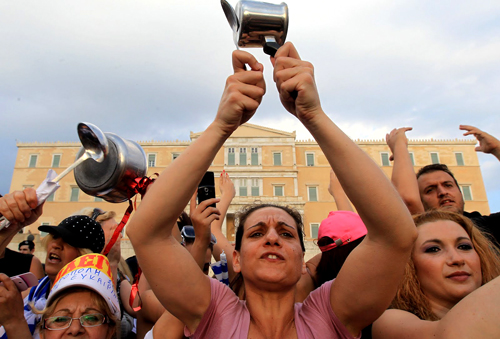
‘This is a war against the people, the entire community. Those who claim that the public debt of Greece is a debt of the Greek people are lying. It is not a debt owned by the people. It was amassed by the governments, in cooperation with the banks, with the aim of enslaving the people. The loans toward Greece are not used to pay wages, pensions or public healthcare. The exact opposite is happening: wages, pensions and health care cuts are used to pay the bankers.’ Open Letter from the Kilkis Hospital Occupation.
The media have dropped coverage of Greece with the apparently successful re-scheduling of Greek government debts following the signing of the Memoranda in March. €130 billion will now be charged to the Greek people. Not for one moment though have the people and working class stood still in the face of the vicious attacks on their living standards. Hundreds of thousands gathered on 12 February in Syntagma Square opposite the Greek parliament as MPs voted to surrender to the diktats of the troika of the European Community, the European Central Bank and the International Monetary Fund. Today the courageous occupation of the Kilkis Hospital under workers’ control continues to inspire. Austerity will force millions of workers to fight back.
Youth unemployment stands officially at 51.1%, while the general rate is 21% – and rising. Benefits have been cut by 20% and will end after a year. People with degrees and professional jobs are sinking into poverty and insecurity, forced to take low paid casualised work in call centres and hotels. The crisis means parents are asking their families for help with basics and mothers are asking relatives to help feed children as wages are completely consumed by rent and utility payments.
Health spending is to be cut by €1bn this year. Half the hospitals face closure or privatisation. Medecins du Monde identified the unprecedented scenario whereby a country of the European Union is facing a ‘deepening humanitarian crisis’ in health provision. Last October the British Medical Association’s Lancet published research entitled ‘Health effects of financial crisis: omens of a Greek tragedy’. Then it was estimated that 40% of citizens had no access to basic medical services. Doctors are treating children who have not eaten for a day. The ill cannot afford to pay for GP visits. Hospital workers are facing wage cuts of 30%. Other reports reveal that the breakdown of the infrastructure has resulted in HIV/AIDS up 1,250% among drug users in Athens, in the first ten months of 2011 compared to the previous year, due to the suspension of free needle exchange programme. There has been a huge increase in cases of TB and endemic malaria has reappeared.
Health workers are co-ordinating their struggles with days of action every week where occupations, strikes and protests unite to challenge the measures. Workers from 15 hospitals occupied the Ministry of Health in Athens, holding general assemblies to plan the fightback. In response to rises in care charges, collection offices have been shut down and occupied.
Greece has a population of 11 million people – similar to Cuba. It is a savage indictment of capitalist crisis that a developed country in Europe is mercilessly scything its health provision while blockaded Cuba, an under-developed socialist country, can provide a high standard of free medical and social care for all of its people. Instead, Britain demands that Greece honours a £3.3bn order for Typhoon fighter aircraft, Germany a £1.5bn order for submarines and France a £3bn order for frigates.
School students staged walkouts and marched in Athens and Heraklion to protest at teacher shortages, heating being turned off in schools and lack of textbooks. Workers at the Eleftherotypia newspaper http://ekprosoposeleftherotypias.blogspot.com – on strike since last December – have taken the step of publishing their own workers’ newspaper to make their arguments for organising against the crisis. Their first edition sold 31,000 copies in Athens. Alter TV station was occupied by defiant workers while steel workers at the privately-owned Hellenic Steel Mill in Athens have been on strike since October 2011 after the company demanded either a 40% cut in jobs or a 40% cut in wages.
This crisis and its devastating social consequences are not aberrations of the capitalist system but deliberate shock therapy to restore profitability. Wages are predicted to fall 40% by 2015 as German economists call for the creation of ‘special economic zones’ with special tax concessions for investors and reduced workers’ rights. Corporate tax will be reduced from 20% to 2% while the minimum wage is pegged at €300 a month. Third World conditions, which have always existed in Europe for immigrants, are now to be forced upon the rest of the working class.
Strategies are being debated furiously as the Greek working class fights to find a way forward out of the capitalist crisis. The effectiveness of trade union-led general strikes, reliance upon the outcome parliamentary election at the end of April, political organisation and ideologies, all are being tested in the unforgiving furnace of class struggle.
Michael McGregor




